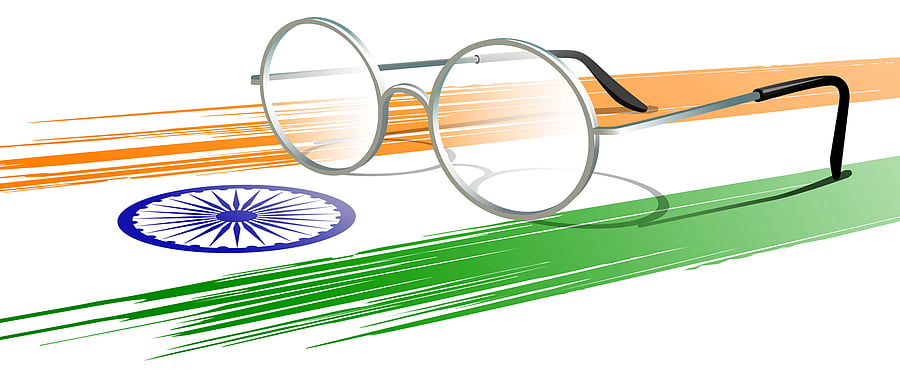
When a professor asks Munnabhai what he knows about Gandhi Jayanti, the good-hearted goon replies in his characteristic style that he only knows Gandhi was a zabardast sort of chap but he has no idea who ‘Jayanti’ was. Lame joke, but with a grain of truth nevertheless.
No one knows Gandhi. Everyone knows Gandhi. Even post-millennials, it seems. Five-year-old Vivaan thinks Gandhi is the ‘money uncle’. “But he does not have hair,” he declares as an afterthought. Eleven-year-old Vrishab Bharath, a sixth-grader in School Of India, is more circumspect. Having studied his elementary classes in Dallas, Vrishab first heard of Gandhi in his fifth grade in a lesson on India’s freedom. “When I think of Gandhi, I think of happiness, because, freedom, you see,” he says gravely.
Clearly, Gandhi is so much everywhere that he is hardly there. He is on our notes no matter how gaudy they get, he is certainly the name of at least one street in every city, he looms large in our textbooks, and he is even in our PJs about poor grades, theatre seats as well as useless mailers! But wait, what about the millennials? Is he causing any chemical locha still (like he did to Munnabhai in the movie) in their mindspace?
Gandhi as a concept or as a person?
Swati Simha, who is a true-blue millennial and is studying for her PhD at the School of International Studies in JNU, says because we are often taught history as if it is individuals who make and change it, men like Gandhi become fodder for a dangerous sort of ‘hero worship’ that brooks no argument. “Gandhi is either worshipped or hated. We should begin by first learning to see him as a person,” she says. She adds that though the Gandhian values of tolerance and non-violence are especially relevant in today’s post-truth society, we must steer clear of looking at them as absolutes. “Gandhi’s rejection of modernism deserves respect but the utopian society he advocated was rather oblivious of the inherent violence in certain existing structures such as caste,” she feels.
Eminent professor of Philosophy in the University of Maine, Douglas Allen, who has also been a distinguished chair in Gandhian philosophy at IIT Mumbai, confirms that in his experience, millennials are indeed turned off by Gandhi’s principles though Gandhi himself was never a stereotypical, dogmatic absolutist as he is often portrayed to be. “Gandhi does not have some blueprint that can allow us to solve all of the problems facing millennials and post-millennials. Some of what Gandhi wrote was ill-informed and reactionary. For example, when my millennial students read some passages from Gandhi on his advice to those who have been raped, on sexuality, and on birth control, they are shocked and often dismiss him. I then show them how Gandhi sometimes revised these views and how other passages on the status of women are progressive,” he explains.
Compassion, above all else
Gandhi’s self-admitted ‘failed experiments with truth’ must not take anything away from his values of truth, humanism and self-belief. “These have enduring value and can be of great significance to the lives of millennials struggling with a pluralistic, confusing world,” the professor emphasises.
Varshini Vijay, a 25-year-old storyteller and a young business director at an auditorium company, agrees with the Maine professor. “Maybe I just had a great history teacher, but to me, Gandhian values have never gone out of fashion. The biggest contribution Gandhi made is to talk and talk again about compassion and tolerance... how can that ever be irrelevant?” she asks passionately. She believes, as a 21st-century youngster, if she has to represent the Mahatma in her art, she would base her story on what he demonstrated in his own life rather than what he preached. “We lack tolerance in today’s world and what we need most is compassion for those unlike us. He lived this ideal, no matter how difficult it actually was to, in practical terms. And that is what I would portray.”
Not just for rote learning!
Educationist and principal of the New Age World School Shylini Soans, whose school follows a curriculum that she says is heavily derived from Gandhi’s teachings, believes the Mahatma’s relevance lies in the fact that he was one of the foremost proponents of linking school curriculums to industry needs.
“Gandhian values are about transformative change and by their very nature difficult to follow through. If anything, it makes them weightier than ever,” she says. Gandhi’s stand on truth, non-violence and peace are well known, but there are certain lesser-known values he practised and spoke about that are apt for millennials, she adds. “Gandhi was a karma yogi; he was fearless. We need to remind our children about doing things for others with no strings attached, like he often did. And needless to say, Gandhi’s bravery that essentially sprung out of his honesty is something to be emulated by children and adults alike.”
So, do we need Gandhi?
There is a severe crisis of untruth, violence and disharmony in the world today, and we are all trapped in its midst, millennials or not. But it is this much-maligned generation that is bearing most of the burden of this churn.
As Prof Allen eloquently puts it, if seen with the right perspective, it is Gandhi and Gandhi alone who can serve as a catalyst, challenge us to rethink our values, and deepen our understanding of violence (and non-violence). If the millennials give him a chance, a ‘Gandhi-informed’ approach can radically change how they relate to their own self, their loved ones, as well as the world as a whole.
Perhaps then, we can all collectively lift ourselves out of the hole we are currently busy digging.
Maybe Munnabhai does know best; maybe it is time to let that zabardast chap resort to some of his tried and tested chemical locha once again.